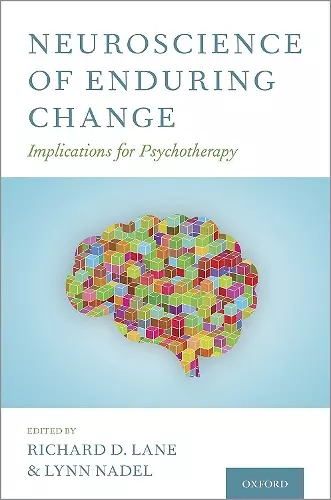Neuroscience of Enduring Change
Implications for Psychotherapy
Lynn Nadel editor Richard D Lane editor
Format:Hardback
Publisher:Oxford University Press Inc
Published:5th Jun '20
Currently unavailable, and unfortunately no date known when it will be back

Neuroscience of Enduring Change is founded on the premise that all major psychotherapy modalities producing enduring change do so by virtue of corrective emotional experiences that alter problematic memories through the process of reconsolidation. This book is unique in linking basic science concepts to clinical research and clinical application. Experts in each area address each of the basic science and clinical topics. No other book addresses a general mechanism of change in psychotherapy in combination with the basic science underpinning it. This book is also unique in bringing the latest neuroimaging evidence and cutting-edge conceptual approaches to bear in understanding how psychological and behavioral treatment approaches bring about lasting change in the brain. Clinicians will benefit from the detailed discussion of basic mechanisms that underpin their clinical interventions and will be challenged to consider how their approach to therapy might be adjusted to optimize the opportunities for enduring change. Researchers will benefit from authoritative reviews of extant knowledge and a clear description of the research agenda going forward. The cross-fertilization between the research and clinical domains is evident throughout.
Understanding the therapy change process has fascinated clinicians and researchers for decades. This volume provides an important contribution to this understanding by linking basic research on neurology and emotion to clinical practice. Linking these findings to the contributions of differing approaches to therapy, the authors address a most important question, namely 'What can be an agreed-upon core or consensus in psychotherapy?' * Marvin R. Goldfried, PhD, Distinguished Professor, Psychology Department, Stony Brook University *
Psychotherapy is often about change, and typically happens with little thought about the underlying neural underpinnings; Neuroscience of Enduring Change fills this important void. In this marvelous collection, Lane and Nadel have gathered together some of the finest minds to offer their perspectives on memory and emotion, from both a basic science and a clinical point of view. In these high-quality chapters, readers are treated to an inspirational approach for thinking about how and why people change for the better during mental health treatment. * Elizabeth F Loftus, PhD, Distinguished Professor, University of California, Irvine *
I strongly recommend this book that presents a reformulation of biopsychosocial change in psychotherapy. It describes a suitably complex computational neuro-circuitries perspective as well as an exciting effort at psychotherapy integration. The authors synthesize concepts about how techniques from various schools all affect memory activation and reconsolidating, a form of plasticity. * Mardi Horowitz, MD, Distinguished Professor of Psychiatry, UCSF Weil Neurosciences Center *
Psychotherapy is a learning process, a way of changing mind and behavior by forming new memories. With contributions by basic scientists and clinicians, The Neuroscience of Enduring Change builds on the science of memory to offer valuable new insights into how the effects of therapy might be made more persistent. * Joseph LeDoux, PhD, Henry And Lucy Moses Professor of Science, Neural Science and Psychiatry, NYU *
ISBN: 9780190881511
Dimensions: 165mm x 236mm x 36mm
Weight: 885g
504 pages